With lots of newfound time on my hands, I decided to jot down all the best travel tips I’ve learned from my many years travelling.
I’ve lived and worked in multiple countries, climbed mountains, slept in deserts, hiked until my feet bled and patched them up with whisky and a smelly old shirt. I’d have killed for even half of these tips 20 years ago!
Instead, I fumbled around from mistake to mistake. Learning the hard way can be fun too, but it shouldn’t be your default.
Whether you’re a digital nomad, camping enthusiast or weekend warrior, whatever your style of travel, you’ll find some gems here.
So, grab a cup of coffee, make yourself comfortable and get ready to make some notes.
Enjoy.
Table of Contents
Wellbeing travel tips
1) You will make mistakes – enjoy them!
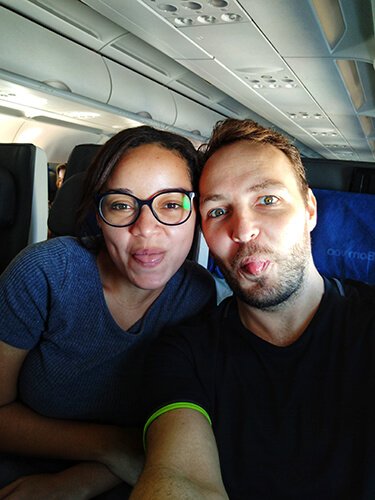 Mistakes happen – it’s impossible to avoid them. You’ll likely break something, lose something or have something stolen. If you travel long enough, all three will pay a visit.
Mistakes happen – it’s impossible to avoid them. You’ll likely break something, lose something or have something stolen. If you travel long enough, all three will pay a visit.
If you’re sensible and don’t take unnecessary risks, then you can minimise them, but inevitably something will happen.
When it does, the only thing you control is your response. Panic and crumble, or deal with the problem and then shrug it off as a lesson learned.
When something unexpected happens, smile. Don’t waste your energy on things you can’t control. Afterwards, you can reflect on the cause and how to avoid it in the future, but in the moment, embrace your inner Taylor Swift and ‘Shake it off’.
2) Break Out Of Your Comfort Zone
Significant achievements aren’t made from the safety of your comfort zone.
It’s only by pushing yourself, developing, learning, growing, trying new things and exploring that you’ll discover who you are, what you want from life and how to achieve it.
The sense of achievement from finding your limits and then pushing past them cannot be put into words. I will warn you though… it becomes addictive.
It can be as simple as starting a conversation with a stranger at a hostel or as huge as selling your house to finance your dream lifestyle. I’d probably suggest starting small, but taking big risks can lead to huge rewards too.
3) Don’t Over Plan
Magic usually happens when you’re least expecting it.
I like to fly by the seat of my pants when I travel. Yes, I’ll miss some things, but I’ll also open myself up to random events.
Allow yourself to be swept away in the moment and see where the universe takes you.
Posting on a random Facebook group thread led to me waving to the President of Paraguay in a field of cows. That certainly wasn’t planned!
4) Travel By Yourself Occasionally

If you normally travel with friends or family, give solo travel a chance.
No matter the length of time, you’ll need to activate a completely different skillset. Even if you normally take the lead when travelling with others, solo travel is a different beast.
You answer to no-one and every choice you make impacts only you. It’s not for everyone, but it’s good to blow off the cobwebs now and again.
It could also remind you just how much you love travelling with your normal companions.
5) Stay In Touch With Loved Ones
I’m certainly guilty of going off the radar for days, weeks or even months.
It’s easy to get wrapped up in your own existence and forget about the people far away who care for you.
And when you check-in, don’t just brag about your amazing existence (guilty too). Bring people (virtually) on the journey with you. Share the food, culture and peculiarities.
Share the highs, lows and answer any questions while remembering that they have lives too.
6) A lack of internet is not the end of the world
God forbid you land in a destination with no internet!
We’re so dependant on tech nowadays that it can feel empty when we’re cut off, but that’s a good thing! Use the time to look around, make friends, get to know yourself or read a book.
It’s okay to be silent and reflect without a constant stream of information tunnelling into your brain. Embrace the quiet.
As long as you keep key people informed of your movements (for me that’s my girlfriend), it’s okay to disconnect.
Throw yourself completely into the new culture and you’ll have even more to report back when the internet returns.

7) Detox occasionally
I’ve been guilty of burning the candle at both ends… once or twice.
Travelling can be fantastic for your social life, but a bit of a strain on the liver. If you’re pushing yourself too hard you’re susceptible to burnout, fatigue and potentially illness.
Cut yourself some slack and take your foot off the gas every few days. You’ll appreciate the highs that bit more.
Use the time for exercise, meditation, eat healthily, catching up with friends and family or, as I did in Buenos Aires, just go full-on hermit. Put a ‘do not disturb’ sign up and enjoy the silence.
8) Respect your feet!
4000m up a mountain or strolling down the Champs-Élysées, respect your feet!
Before my first trip to South America I invested in some expensive ‘all-purpose’ shoes. Waterproof, rugged and suitable for all occasions, I was prepared for all terrain.
#spoileralert They were awful!
They looked ugly, felt ugly, the grip was no better than my normal trainers and the waterproof element made my feet constantly sweaty.
They also ripped my feet apart whilst hiking through Patagonia.
Sore feet when you’re travelling is the worst! Sore feet in the mountains is a different kind of hell, but that’s a tale for another day.
If in doubt, choose comfort.
9) Don’t neglect your mental health
This should probably be #1 and definitely one of my best travel tips.
Travel can be tough on the nerves. When you’re far from home and loved ones, paddling upstream without a paddle and nothing’s going right? It’s hard to keep a stiff upper lip.
But they’re only the obvious triggers. Depression can creep in even when things are all sunshine and rainbows. It can be so subtle that no-one notices until your world comes crashing down around you.
Loneliness, over-thinking and anxiety can all contribute, and they’re all common issues when you’re away for any length of time.
How you deal with it is your business. You need to find what works for you. Some people find crying helps to release the valve. I couldn’t cry even if I wanted to.
Meditation, regular calls with family and friends, journaling… they’re all techniques for maintaining good mental health.
If they don’t work, ask for help. That’s not weakness, it’s strength. Admitting you’re not okay is a huge sign of strength

10) Hug a tree
Get yourself away from the concrete jungle and into nature.
The benefits of surrounding yourself with greenery include:
- Reduced stress hormones
- Increased attention span
- Lower blood pressure
- Increased physical and emotional wellbeing
- Improved sleep
You don’t have to go full-on hermit in the mountains. Spending an hour in a local park is enough to get your green fix.
One tip: don’t just sit in the park staring at your phone. Get away from the blue light. Read a book, listen to music or just sit and appreciate the world.
Use the time to disconnect and appreciate the beauty of the world around you.
General travel tips
11) Head to the nearest pub
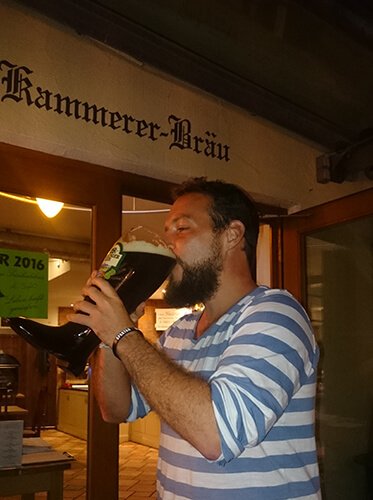
The first thing I try and do whenever I touch down in a new city is head to a bar. This serves several purposes:
- How much is the local beer?
- Is the local beer good?.
- Tips and advice from the bar staff.
- Take a window seat to watch the habits of the locals.
- Listen to the other patrons to see how much of the language you understand.
- Time to study the map and find your bearings.
12) Take a lot of travel photos
If you’re a content creator you’ll know the importance of quality images.
It’s clear when a travel website uses stock images. While it’s sometimes unavoidable, the overused images can cheapen your work and detract from the content.
Take a ton of photos when you’re travelling and create your own image bank. If they’re good enough you can even sell them and earn more travel dollars.
Set them to automatically backup to cloud storage when you connect to wifi and you won’t have to worry about needing extra storage.
13) Go on free walking tours twice
Wait a minute… why twice?
I like to use the first time just for me – no cameras or distractions. I soak in all the knowledge and directions, ask all the questions I can think of and just enjoy myself.
Then, the second time around, I have a much better idea of awesome photos I can take. You’re still in the safety of the tour group (versus if you walked around on your own) so getting your camera out is fine.
True, you may have to tip twice but for me, it’s worth it. You can get a ton of useful information from the walking tours which you’d never get elsewhere.

14) Say yes whenever possible
As much as it terrifies my girlfriend and family, I love saying yes to any and all offers.
- “Do you want to come and party in the jungle?” Yep.
- “Do you want to hire a car with us?” Absolutely.
- “Would you like a beer?” Always.
From those 3 yeses I woke up with a new tattoo in the Guarani language, wild camped in some of the most jaw-dropping lakes in Argentina and woke up on random Church steps after being drugged and mugged by a Costa Rican cowboy.
The power of Yes is limitless!
While a few of those examples may not have been the most convincing, your life will be so much richer if you approach things with positivity and a liberal use of the word Yes.
15) Observe
You have 2 eyes, 2 ears and 1 mouth so watch and listen twice as much as you speak.
Sounds cliched, but it’s true. To get the most from your travel experience you’ll want to be present in the moment. That can mean interacting with your environment, or it can mean just observing it.
Take time to watch the world go by. Observe the daily habits and routines of the people around you. Each country and city has its natural rhythm and flow. Take the time to learn it.
16) Visit tourist destinations
I consider myself a traveller more than a tourist, but I still love hitting the big attractions.
There’s a reason they’re so famous… because most of them are awesome.
Don’t cut your nose off to spite your face. It won’t make you less of a traveller to take that selfie with Christ the Redeemer.
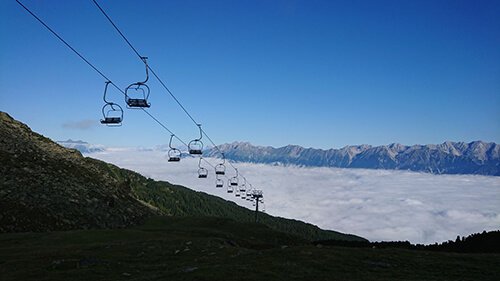
17) Avoid tourist destinations
Wait a minute! You just said to visit them all!
Yes, I did, but don’t JUST visit them.
Most global tourist attractions are surrounded by tourist traps – souvenir shops and expensive restaurants. You’ll rarely find an ‘authentic’ experience by just visiting them.
Get away from the tourist hotspots and visit the more quaint, ‘real’ districts. While they may not have the WOW attractions, your experience will be much richer and well rounded because of it.
That’s where you’re also likely to find cheaper markets, bars and souvenirs.
18) Music holds memories
For a truly rounded travel experience don’t overlook the local music.
Music holds memories as much as a photo or meal.
Ask the locals for a selection of authentic music and give it a listen. A good Brazilian Samba is an unforgettable experience, as was a beach bongo (quite sure they weren’t bongos but I’m no percussionist) session in Tonga, German slap dancing, a Norwegian metal night or singing your heart out in a pub in Temple Bar, Dublin.
Each captured a unique moment in time.
When I hear any of those styles now I’m instantly transported back.
Save a local playlist wherever you go – I prefer Youtube to Spotify as the videos give an extra layer of memory/context.
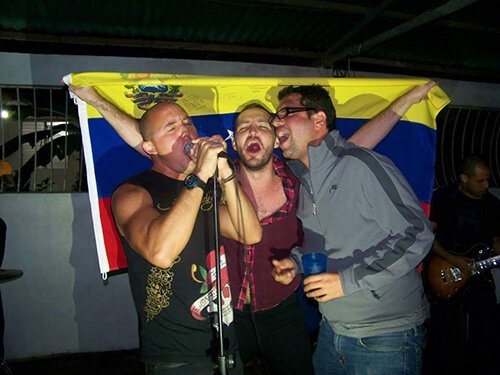
19) Souvenirs are not the devil
I’m not a big one for personal possessions but I’ve collected a few flags from around the world.
I wish I’d have done it from all 44 countries, but hindsight’s a beautiful thing.
Rather than keep them with you I’d recommend posting them back to a reliable address – friend or family. When you eventually decide to settle down those little items can transport you back with just a glance.
Flags, fridge magnets, shot glasses, postcards. It doesn’t have to be big or expensive. The tiniest memento can pack a ton of memories.
20) Get off the beaten track
Big cities are full of adventure but don’t overlook little towns or villages.
When people told me Bahia Negra in Paraguay was tiny and I shouldn’t waste my time going I knew deep down they were wrong.
In my week there I learned to fish and eat piranha, drank beer with a Capybara, wrecked my feet playing football with the local kids, taught ukulele to half the village, met the President of Paraguay and flew back to the capital in a military plane without functioning seatbelts.
You make your own adventure.
I’m not saying every little village will be action-packed, but you’ve no idea unless you visit.
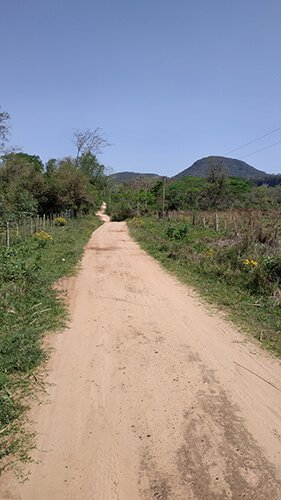
21) Slow down and enjoy the ride
When it comes to travel, less can definitely be more.
People who try and cram in every attraction, every landmark and every city on their trip usually end up burnt out and in desperate need of a vacation.
Half your number of destinations and spend twice as long in each. Savour the little details – enjoy a sunset, try the ‘dish of the day’, spend a day wandering around a local market. These little details will cement lasting memories, much more than a few rushed photos.
You’ll also save money on transport and accommodation, plus you’ll have more time to get to know people and make connections.
22) Get lost
Getting lost in a foreign city can be awesome fun!
It’s not advisable in all cities so use some common sense, but 90% of the time it’s a great idea.
I spent weeks in Buenos Aires deliberately getting lost, exploring and trying to find my way back to basecamp. It’s impossible to put everything in a travel guide, so there’s always more to find.
When you wander you discover cute little cafes, restaurants, bars, parks, graffiti and local attractions.
With a data connection, Google Maps tracks your route so you can revisit memorable places at a later date.
Read more about getting lost in Buenos Aires. It wasn’t pretty on the feet, but it was a lot of fun.
23) Learn the pleasantries
A little can go a long way when it comes to a foreign language.
Fluency would be amazing, but it’s not always practical or possible. Even if you only learn some polite words and phrases – hello, please, thank you, Where is, how much is it etc, it’ll go a long way.
If you show willing and make an effort, most people will reciprocate. It won’t work every time, but it’s better to try and fail than to miss out on the opportunity.
But what if I make a mistake or people can’t understand me? It’s going to happen! I guarantee!
The only way you’ll ever learn is if you give it a go. Make mistakes, feel silly and then make more until you get it right. If a local takes the time to help you out and learn the right word, you’ve just made a connection.
Check out my review of the best language learning apps here.
24) Keep an open mind
The world is a fantastic place full of random customs, traditions, cultures and practices.
What’s normal to you may be completely alien to someone on the other side of the planet. Normal is subjective.
Sometimes it’s hard to keep an open mind. Somethings run so contrary to our personal beliefs that you feel you must speak out, but most of the time it’s best to bite your tongue.
Respectfully ask questions and start a discussion, but try and leave the judgement at the door.
This isn’t just one of my best travel tips, it’s just good advice for life in general.
25) Try volunteering at least once in your life
If you want to get to know a place and its people, volunteer.
If someone knows you’re a tourist or traveller, they’ll treat you differently. It may not be a conscious choice, but you’re foreign so people are likely to act differently around you.
As a volunteer, you insert yourself into their society. You slowly become a local, learning the language, customs and mannerisms.
A good volunteering position can be a life-changing experience – new skills, abilities and lifelong friends. Worldpackers, HelpStay or Workaway are all worth checking out.
I approach each new volunteering project with the mindset of ‘what can I bring to them?’ How can I improve their project or business with my unique set of skills?
I want to not only enjoy the experience but to make an impact too.
Read about my time volunteering at The Butterfly Conservatory in Costa Rica.

26) Study up on the country before you visit
I’m guilty of not doing this enough.
I try and make up for it by enquiring about the local history wherever I go.
While museums and galleries can be fantastic, books and movies about a location can open a whole new world. Plus it then gives you an ice-breaker when speaking to locals.
Your passion and desire to learn about their land will be greatly appreciated.
27) Try the local food
Local food can tell you so much about a country.
If it’s safe to do so, try all the street food you can find. Food’s as much a part of the culture as the language and music, so embrace it at every opportunity!
Take it one further by trying to do a cooking class in each destination. You don’t have to be a master chef. It could open up completely new ideas for common foods.
As for where to eat, it’s usually a safe rule to look for the locals. If you see lots of local people eating there, be it a food cart, cafe or mobile street vendor, you should probably give it a go. It usually means it’s good value and tasty food.
Even if you’re not sure what it is. Try it. If you don’t like it, lesson learned. If you do, winner!
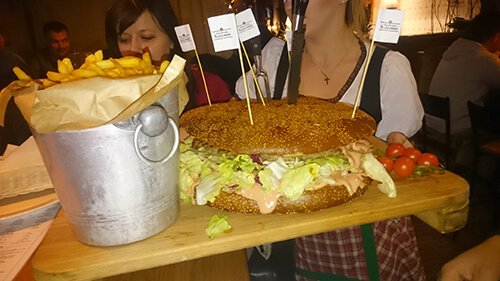
28) Treat yourself occasionally
As a longterm traveller, I prefer to scrimp and save my money, if that means I can stay out for longer.
I’ll scrimp on most things – food, accommodation, clothing. A little discomfort for more time on the road seems like a reasonable trade for me.
That doesn’t mean I don’t occasionally like to splurge. If there’s an activity or event that resonates with you then do it! As long as you’re not wiping out your entire savings, do it!
Money comes and goes, but memories and experiences can last a lifetime. I know other travellers who didn’t do anything unless it was free. While they enjoyed themselves, they also missed out on a ton of adventures.
Each to their own, but my advice is not to feel bad for treating yourself once in a while.
29) Avoid resorts and hotels
You’re not going to gain much of an insight into the local culture from your 5-star resort.
I like to bounce between hostels, B&Bs, volunteering and Airbnb, depending on my workload and looming deadlines. Whenever possible I’ll stay with locals, friends and friends of friends.
If you’re ever invited to stay with a local family, wherever you may be, give it a chance. You’ll get a crash course in daily routines, typical homemade meals and hear super casual language, plus you have the opportunity to share some of your own knowledge and customs.
Hotels do have their place though. Hostel life can wear you down. Depending on the location it can be a relentless flow of names and faces, parties and storytelling.
As with #28, treating yourself occasionally isn’t a bad thing. Clean sheets, room service, a quiet environment… sometimes a few days is all you need to recharge.
30) Ask for advice and directions
I’m fairly confident in my navigational abilities, but I’m certainly not too proud to ask for help and directions.
People who are too stubborn or proud baffle me. While you sometimes have to take their directions or advice with a pinch of salt, information is power.
I’ve said before, I like to get lost and wander. That’s my style. I also ask lots of questions when I’m lost.
The ticket system in German train stations can be a little confusing. I was rushing through with my good friend Dave and, rather than ask for help, we guessed at which ticket to buy.
A few miles down the track the ticket inspector paid us a visit. Turns out our guess was wildly inaccurate and we had to pay twice as much. We could have saved money at the station… if we would have asked.
If in doubt, ask.
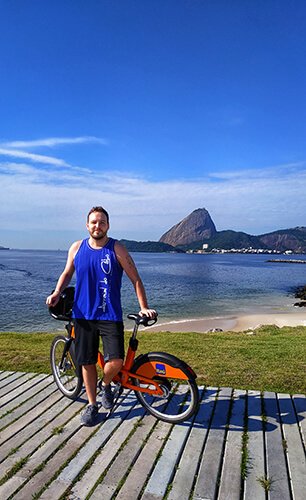
31) Hire a bike
I was late to the cycling game, not properly learning until in my late 30s, but I’m glad I did.
For exercise they’re great, but for travel cycling opens up new opportunities unavailable to those on foot or public transport. Cycling along a beach has a completely different feel than walking. Cycle to find the best location, far away from the foot traffic.
If the city you’re in has bike stations dotted around (like Rio de Janeiro) then you can cycle far away, drop the bike off, go explore on foot and then cycle back home.
I’m still terrified of cycling on roads, but it’s something I’m working on so I can cycle wherever we visit.
32) Take more photos of yourself
This is something I was guilty of earlier on.
I’ve always loved taking photos, but I only recently became comfortable taking photos of myself. When you take the time to include yourself I think it cements the memory deeper in your mind.
Photos with faces are also much better for branding should you wish to later on.
Plus, for friends and family, it’s much more reassuring for them to see images of you laughing and enjoying your adventures.
33) Don’t believe everything you read
I try and avoid the news whenever possible.
Most of the time it’s either depressing or sensational. I have enough of that in my own life, thank you very much.
It also skews your opinion of foreign countries. After years of reading and watching the news about Israel being a rather choice country to visit, it turned out to be one of the best summers of my life.
Fantastic people, delicious food plus mind-boggling history and architecture. Yes, the military presence in the streets was a little disconcerting, but we had no trouble whatsoever.
You can read all about my time in Israel in my Amazon #1 bestselling book Bag Up: Backpacking around Israel without a plan.
Do your research and use common sense, but don’t fear the unknown.
34) Book the cheapest flights possible
One thing I’ll happily sacrifice is comfort on a plane.
I usually get the cheapest flight possible, which means sitting in the middle, near the toilet and with a broken chair that doesn’t recline. So be it.
I know I’ll put that saved money to good use later down the road. Skyscanner, Momodo and Kayak are good places to begin your hunt, whilst also remembering to use price alerts whenever possible.
Priority check-in baffles me the most. You all arrive at the destination at the same time. Why oh why would I want to sit on the plane before anyone else?
Save that money for a bungee jump or fabulous meal when you arrive.
If you need help finding cheap flights, check out my post about becoming a digital nomad.
35) Always write down your address
I’ve made this mistake a time or two.
You become overly confident with your technology to remember everything, then your battery dies and you’re completely screwed.
Jot down the address, area and any specific localised directions. There may be 3 or 4 streets named the same where you’re going – context goes a long way to making sure you reach your destination.
If you do write it down, don’t keep that address in the same pocket as your keys though. You don’t want to tempt fate.
36) The early bird gets the elbow room
If you have things to see and do, set your alarm. The early bird avoids queues and pickpockets.
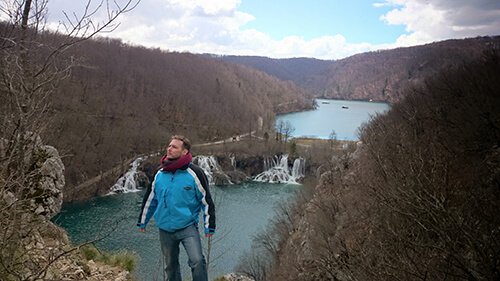
37) Travel insurance is a necessary evil
If you think it’ll never happen to you, think again.
Be safe, get insurance.
Not all travel insurance companies are created equally. World Nomads has a good reputation, and deservedly so. Their coverage is comprehensive and their after-sales team are reliable.
Get a quote here, and then factor that amount into your pre-trip savings.
38) Alert your bank you’re travelling
The last thing you want is your card being blocked while you’re away in some faraway land.
All it takes is one call before you fly away to alert them to the countries you intend to visit and a rough outline of when.
This came in very handy when my card was cloned in Chile. I hadn’t planned to go there, so the bank flagged a large transaction in Santiago. I was able to recover the money in less than a day.
It’s also wise to save your bank’s emergency contact numbers somewhere safe. Email them to yourself too.
39) Patience is your new best friend
Whether it’s waiting for a flight, hostel check-in or praying for your 44-hour bus ride to end, patience can be your greatest travel partner.
I find people watching makes the time fly by. As a writer, I’m forever imagining new lives for them – names, origins, where they’ve been, their next destination etc.
When I’m not playing God, I like to binge on audiobooks.
If you’re new to audiobooks then get your first one free with Audible.
Packing travel tips
40) Pack with a system
I swear by dry bags. They come in all colours and sizes and make packing much less stressful.
I use my various coloured drybags to systematically pack my bag. Clothes are in my 15-litre red bag, electronics in the 10-litre blue, all GoPro tech is in the 8-litre grey etc. At a glance I can find everything I need, or in the dark I can dig blind and locate whatever I want in seconds.
Packing cubes are also an option, however I find them less versatile.
When your dry bags are empty they can be used for dirty laundry, for carrying food, as a makeshift washing machine etc You can even blow them up for use as an emergency pillow.
Packing cubes sit better in traditional suitcases, but for backpackers, dry bags win every time.
41) Always carry a basic first aid kit

Hopefully you’ll never need it, but a small travel first aid kit can be a real lifesaver.
I’ve had to bandage up my feet after hiking and mountain climbing, but mostly I’ve used my kit to patch up others. They’re cheap, don’t take up much room and can literally save a life. Don’t scrimp on safety.
Safety pins, elastic bands, antiseptic cream, blister packs, plasters, bandages and alcohol wipes. You’ve no idea when you’ll need them.
Just remember to check and replace items between travels. Certain things have a shelf life. Always double-check.
42) Remember your flashlight
If you’re going camping then a flashlight is a must, but they’re also just as important in urban environments.
An electrical failure can happen every other day in some countries. I always carry 2 (head torch and handheld) split between my day bag and backpack. They’re tiny yet powerful and have saved me from an untold amount of situations.
It’s also wise to pack some spare batteries as you may not always be able to find them on the road.
In an absolute emergency they can also be used to signal for help, although I’ve never personally done it.
43) Bring your own water bottle
Reduce your plastic consumption by bringing a water bottle.
Fountains are usually easy to find around the world. If you’re unsure of the quality of the water, drop a water sterilising tablet in your bottle and you’ll be laughing.
Upgrade your bottle to one with a built-in filter and you can do without the tablets.
I also like to bring a Life Straw wherever I go. Lakes, streams, rivers… they’re all available to drink with a life straw.
Hiking through Patagonia it certainly came in handy. Lost, dehydrated and hiding from the baking sun, I found a stream. I’d been warned that not all streams were fit for drinking, but my Life Straw protected me.
Removing 99.9% of bacteria means you can quench your thirst with confidence.
44) Pack less
You truly have no idea how little you can live with until you’ve spent 2 and a half years living out of a 40-litre rucksack.
I sometimes miss my Xbox and scarf collection, but those feelings pass as quickly as they come.
You don’t need a whole wardrobe of clothes or shoes. The fashion police may say otherwise, but you can survive on a rotation of 3 or 4 items.
When something gets old and worn, swap it out.
As long as you have enough to layer up when it gets cold or strip down when hot, it’s enough.
Gadgets are my downfall, but I’ve also learned to pack less and get the most from each.
45) Buy a smaller backpack
This aligns with #44, but this time you’re actively forcing yourself to take less.
Deliberately buying a smaller backpack means you’ll have to become extremely picky with what you’re carrying. Your back and knees will thank you later.
It’s the ultimate dream to get your bags down to just carry-on size. That way you save on checked baggage and avoid queues at the airport.
I’m far from achieving that due to my gadgets and camping gear, but maybe one day.
On my first big trip around Europe I tagged along with some Australians. They had 80+ litre packs, plus day bags! They had everything you could want, but also so much they never touched.
If in doubt, leave it out.
46) Don’t forget your towel
Douglas Adams was a legend, and he knew his towels!
When travelling around Spain in 2001 I packed a bath towel… a huge furry thing which took up most of my bag.
One word: Nightmare!
Now I travel with a huge quick-dry towel. It folds down to nothing, dries in less than an hour and has multiple uses – towel, pillow, sarong, picnic blanket, extra layer to wrap in during the night etc
I’d also recommend packing a second one to use for exercise. I’d recommend the book Solitary Fitness for ideas on how to become buff with just your bodyweight and a towel.
47) Carry a power extension cable
This depends on how many electrical items you travel with.
I like to keep my phone, GoPro and 360 cameras fully charged for all occasions. That means the measly single socket in most hostels just won’t do.
It’s also a huge pain if there’s no plug socket near your bed. You never want to leave things charging out of sight. I’ve had too many phones stolen that way.
You may need to buy one in the country you visit due to the differing plugs. Either that or use a universal adaptor, just be sure to keep an eye on that too.
48) Get a travel card
Life before Revolut was miserable.
When I travelled around Australia back in 2004 travel cards hadn’t been invented. I used my UK card in ATMs with a ‘minimal’ charge each time. I’ve no idea how much that came to after a year, but it’s easily in the hundreds of pounds.
With a Revolut card I don’t pay any transaction fees, I can track my spending to the dollar, sending and receiving money from friends and family is simple and there’s a ton of other perks too.
There are other travel cards, like N26 and Monzo, but I’ve nothing but joy from Revolut so I’ll happily stick with them.
A travel card would have saved me from a weekend of fasting when I was stuck in Munich without a penny.
49) Solid toiletries are better than liquids
Solid bars of soap last much longer than liquids.
They also won’t burst open, covering the inside of your bag with sweet-smelling gooey goodness.
Liquids cause issues at the airport and are usually unnecessarily over-packaged. Head to Lush for some beautiful smelling bars.
50) Toilet rolls are like gold
Toilets around the world… that’s a blog post all by itself.
Some are functional and a pleasure to experience. Others are lifted straight from a post-apocalyptic nightmare future where sanitation is a long-forgotten concept.
If you have to endure such an ordeal, make sure you’re armed with toilet paper.
Colds and nosebleeds are also a joy without toilet paper. Even if they’re not your own, you can be a knight in shining armour by offering a few sheets.
Never leave the house without a roll or two in the bag!
If you take away nothing else, this is one of the best travel tips you could ever learn.
Hostel life top tips
51) Wear your flip-flops every time you shower
If you’ve ever worked or volunteered in a hostel you’ll be acutely aware of how disgusting the bathrooms can get.
No matter how swanky the establishment is, an untold number of bodies will have passed through that bathroom.
The filth I’ve had to clean when volunteering will forever haunt my dreams. Wear flipflops when entering, showering and exiting.
No discussion.
52) Always, always pack your things the night before
Don’t be that person who fumbles around at 4 am in the pitch black trying to pack your bag.
If you’re in a private room, go crazy… pack all night long. If you’re in a shared dorm, do it the night before.
Check, double-check, triple-check the night before to make sure you’re not leaving anything and then depart like a shadow in the night.
Unless you’ve spent time with all the other guests, you’ve no idea their plans, stress levels or mental state. Spoiling other peoples sleep due to inconsideration is not cool.
For those who mess around with plastic bags, unzip every available zip and go back and forth to the bathroom before leaving, may the gods of karma forever haunt your dreams.
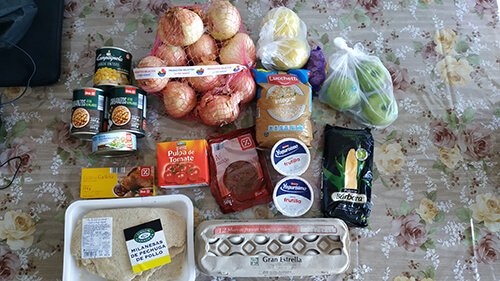
53) Share the cooking in a hostel
I’m not a big lover of cooking.
When I’m travelling alone I usually default to beans, rice, tomato and onion. Simple, minimal and hits most food groups.
What it doesn’t do is excite the taste buds. I can cook, I just choose not to.
If you’ve made a solid group of friends in a hostel then rotate the cooking. If everybody chips in a little the cost goes down, the variety of food goes up and your circle of friends increases.
Also be on the lookout for people eating rice, beans and onion. Invite them over to share your feast. You have no idea how much that small act of kindness can impact someone.
54) Don’t steal food!
If it’s not yours, leave it.
If you happen to make a mistake, own it. I’ve drunk other peoples wine before by mistake. Own it, offer them a glass and then buy an exact replacement.
No matter how hungry or poor you are, and I’ve been very hungry and very poor, don’t steal food from others. It ruins the vibe in the whole place, makes people suspicious and it’s just wrong.
The worst example for me was when someone picked out and ate all the chicken from my chicken pasta. The scumbags even left their dirty fork in the bowl!
The karma gods went hunting that night.
55) Use Meet-up
Not all hostels are created equally.
Some are young and hip, others are non-stop party palaces and others are full of tumbleweed.
If you’re struggling to make friends then try Meet-Up. You have no idea what kind of people will show up, but what’s life without a little excitement?
Whatever your jam, Meet-Up has you covered. A quick scan of the nearby events include:
- Learn Javascript coding
- Guided meditation
- Intermediate photography skills
- Become a toastmaster
- Entrepreneurs brainstorming session
That’s a mixed bag indeed! If you can think of it, there’s likely a group for it.
I discuss Meet-Up along with some other unusual travel problems/solutions in my quick travel survival guide.
56) Use headphones!
I don’t mean to be rude, but not everyone wants to hear your chat with uncle Derrick back home.
If there’s a common area or terrace, take your conversation there. Don’t have it in the bedroom but, if you have to, wear earphones!
Be aware of those around you. As with #52, you’ve no idea how other people are handling life. Don’t add to their misery by shouting into your cellphone or laptop.
And if someone politely tells you to shut the F up, don’t act indignant. It’s a shared space but that doesn’t mean everyone wants to share your conversation.
This tip goes for anywhere on the entire planet, but especially so in hostels.
57) Learn the routine of the hostel
If you want to enjoy a clean toilet area with fresh toilet paper and a dry floor then learn the rhythm of the hostel.
Lots of people will use them early so they can go out for the day. That’s usually a chaotic and nasty time to use the showers/toilet. Observe (#15) when the cleaning staff do their thing and time your business accordingly.
This also goes for the kitchen. Depending on the size of the hostel, the kitchen can be over-run with bodies, making it impossible to cook and clean your dishes.
Find the optimum time and slip in like a ninja.
58) Don’t be rude to the staff
It pains me that I have to write this, but I believe it needs to be said.
I was unaware of how many staff working in hostels were volunteers. People just like me, travelling and trying to save a bit of cash.
It wasn’t until I volunteered in a hostel that I noticed how rude and thoughtless some people can be towards the staff. Regardless of if they’re volunteers or not, they’re people. Treat them as such.
Yes, you may be stressed/tired/upset due to a change of plans or an epic journey, but leave that at the door! Shouting, screaming and demanding silly little things is not the way to go.
If you’re having a bad day, that’s your business. Don’t share that negativity with the world unless you’re asking for help.
59) If you’re low on cash, ask to volunteer
As with #58, hostels are crying out for volunteers.
Don’t be afraid to ask the staff if they need an extra hand. Duties will likely include working the reception desk checking people in and out, changing beds and cleaning the toilet facilities.
If it’s a busy hostel they may require you to have decent language skills – my Spanish wasn’t up to the task during the first trip to Argentina.
If they don’t need general help then offer some other skills – manage their social media, write blog posts, play a concert, cut hair, massage, tattoo, fix the plumbing. Whatever skills you have, offer them. You may be surprised.
Apps and gadget tips
60) Use Honey
Honey is a browser extension that searches the web for coupon codes, checks their validity and applies them.
I cannot explain how much I’ve saved using this free service.
It won’t work for everyone though:
“We currently support shopping sites in the United States, Canada, Australia, United Kingdom and India as well as sites that serve global customers”
If in doubt, try it. It costs nothing but the savings can be huge!
If you’re worrying if it’s legit or not, it’s now officially part of the Paypal community.
61) Use a VPN
Never connect to an open wifi network, no matter how desperate you are.
Viruses, identity theft, malware… they’re not worth it.
A VPN helps protect against those, plus it’ll allow you to watch all your favourite Netflix and streaming shows, regardless of location.
Heading to Brazil? Use the VPN to watch Brazilian Netflix and practice your Portuguese before you go. Once you’re there, switch to a USA location to watch the latest episodes on Netflix USA.
I personally prefer ExpressVPN:
- Bypass geo-restrictions to access:
Netflix, Hulu, HBO NOW, BBC iPlayer, iTV, Sky Go (Italy), Rai TV, Crackle,
Showtime, Sling TV, FX, NBC, ABC, and more - Easy-to-use apps for all devices
- 24/7 customer support through live chat
- Unconditional 30-day money-back guarantee
62) Buy a local SIM or chip
Rather than spend a fortune on a roaming chip, buy a local chip wherever you travel.
If you unlock your phone before you travel you can throw a local chip in whenever you visit a new country.
They’re usually much cheaper than roaming chips, you can shop around for the best connection in that city/country and you can keep your Whatsapp number, meaning your connection to family and friends remains unaffected.

63) Invest in a good power bank
I always like to stay fully charged when I’m travelling – phone, GoPro, 360 camera etc
These all require juice and sometimes I’m away from civilisation for a while.
That’s why I NEVER travel without my RavPower Beast (I named him myself). Multiple charges across multiple devices mean I’m never short of charge.
Rather than get a few lame little power banks I prefer this one. The one downside is it’s a little heavy, so not suitable for carrying in your pocket. On the plus side, it’s sturdy enough to survive a nuclear apocalypse, lasts forever and charges super fast.
64) Back-Up Your Files & Photos!
ALWAYS back up your photos and videos.
I can’t fault Google Photos and Drive. All my photos, videos and files are backed up in the background without any work from me.
They’re geotagged, you can face tag them and add notes should you wish to, plus sharing them with friends and family is super simple.
The free version is plenty of space, but if you’re taking lots of videos too you may want to upgrade to a higher capacity. This too is good value.
65) Use price tracking apps for cheap flights
The perfect companion to a flexible attitude is a good price checking app.
Hopper is my go-to price tracking app for flights. Skyscanner, Google and others also offer a similar service.
Enter your preferred flight details into Hopper and leave it to do its work. It gives you advice on when you can expect prices to rise and fall, and they’re usually accurate.
I’ve saved hundreds of pounds by following their advice.

66) Google translate for menus
While many people are familiar with Google translate as an app, I’m still amazed at how many people aren’t aware of the live translate option.
Load up the app, select the language from and to and click on Camera. Hold the camera up to a menu, street sign or document and it’ll do a reasonable job at translating before your eyes.
It’s not always 100% accurate, but it’s good enough to avoid eating anything poisonous on the menu.
It also has a live conversation translator and a transcribing service. The Google translate app is much more than just a foreign dictionary.
Be sure to download the languages you’ll be using beforehand. This means you won’t need an internet connection to use it fully.
67) Use Google maps
There are other map apps out there, but I’m firmly in the Google Maps camp.
Download the offline map before you travel and you’ll never get lost ever again… unless your battery dies.
You can tag and label destinations based on people’s recommendations, which is huge if you’re a traveller. Before I learned about the labelling option I’d just tag everything. Weeks later I’d have no idea why I’d tagged them.
Google also tracks your travels. Some people find this creepy, but I don’t mind. I blog about everywhere I go so it’s no secret. Combine it with Google photos and you can see exactly where you took which photo, where you walked and what distance you’ve covered.
I love to geek out over those kinds of stats at the end of a trip.
68) Use Facebook groups for research
Before you travel to your new destination have a search for Facebook groups.
I recently travelled to Paraguay on a writing assignment. I knew I had specific groups and people I wanted to speak to, so I reached out in an ex-pat group.
An ex-pat is just someone who’s settled down in a foreign country. The Facebook groups contain a wealth of information and are a great place to start asking questions.
Through this group I made a ton of contacts, got some great advice and even made a couple of good friends who I later travelled with.
If you’re planning to stay in a country for any length of time and want some insider knowledge, search for an ex-pat group.
69) Protect your electricals and gadgets
I’ve broken tons of equipment due to complacency and stupidity.
Example: I had a mini-keyboard to use with my phone. It was perfect for writing quick blog posts when I didn’t want to pull the laptop out. I kept it in my hand luggage all the time so I could write a quick 200-500 article whenever a random event happened.
One day I was caught in a flash storm. While most of my equipment was safe, the keyboard took some water damage and sadly passed away.
ALWAYS protect your electricals – batteries, cables, devices. Check them regularly, remove batteries when not in use and store them in dry bags (see #40).
Health & hygiene travel tips
70) Look after yourself
It’s easy to get swept up in the craziness of travel – no rules, no inhibitions, ultimate freedom.
Been there, done that, nursed the hangover.
While I had a wicked time, my memory from that period may not be the best. I do however remember how hellish the bus/train/flights/hikes were the following day.
While it’s perfectly normal to let loose, it’s important to remember that you only have 1 body. Mess that up and you’re in trouble.
If you’re a digital nomad then spending too much time sitting behind a keyboard can be equally destructive. Find some physical activity to offset the daily wear and tear of travel – yoga, callisthenics, meditation, HIIT.
Your body will last longer and thank you for it years down the line
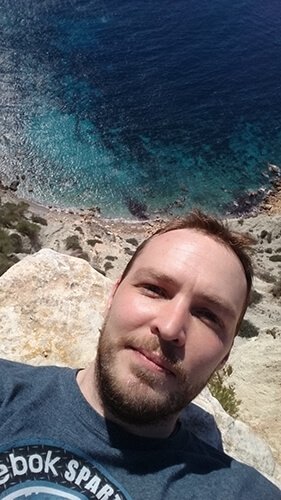
71) Do your laundry
While I encourage you to pack light and reuse your clothes, don’t be nasty.
Having an earthy smell when you’re outside and running free is fine… go feral! Smelling like a rotting corpse while on a 14-hour flight is not cool.
Don’t be that person!
A bar of soap and a sink/bottle of water are all you need to add some much-needed freshness. Then, when you get the opportunity, throw every item you have into the laundry and rejoice in the feeling of freshness.
72) Drink more water
In the before time, working in an office, I’d drink litres of water every day. When I travel it’s always one of the last things I do.
If you’re constantly moving around, seeing and doing awesome new things, you’ll need to drink more.
Bad moods, headaches, fatigue, illness and sleepless nights are all symptoms of dehydration.
It’s recommended you drink 2 litres of water per day. If you’re active and moving around all day you’ll need more.
See #43 regarding water bottles.
73) Vaseline & Vicks menthol rub
I always bring a little tub of vaseline (petroleum jelly) on long trips.
Uses include:
- Heal minor skin scrapes and burns.
- Moisturise your face, hands etc
- Soothes chafed armpit, thighs etc
- Help prevent rubbing from new shoes
They’re the standard uses. More unusual uses include:
- Hair cream
- Prevents rusting of razors or mountain climbing equipment
- Stops squeaky doors and windows (useful in old hostels)
Vicks VapoRub feels the same but heals in other ways. The main use is for colds and coughs, but I carry it to combat headaches. Rub a little on your temples and forehead while you lay down and feel the headache drift away.
It’s also useful for banishing mosquitoes, healing spots and healing stretch marks.
74) Stay nourished
Explore the food culture while staying nourished.
I’ve been guilty of saving money by eating cheap junk food. Microwave noodles are incredibly cheap, but a week of them will leave your body empty of nutrients.
Warning signs include mood swings, lethargy and bad hair/skin.
If you’re not putting the right fuel in, you’re going to damage the engine.
Visit the local food markets. Speak to people who live and work there about what’s healthy and what’s not. Trying unusual and exotic foods is an awesome way to explore a new land and expand your horizons.
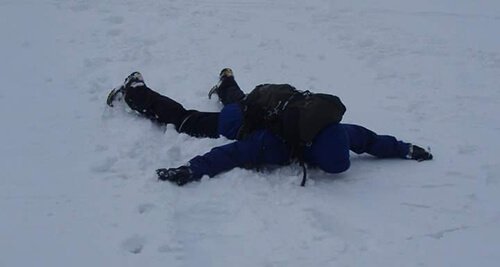
75) Sleep!
As with a poor diet, a lack of sleep can ruin you.
A lack of good sleep can lead to:
- Reduced sex drive
- Poor skin
- Mood swings
- Forgetfulness
- Weight gain
None of those sound enjoyable, so make sure you’re getting some shut-eye. If you’re sleeping in dorm rooms it can be tricky. That’s where earplugs come in handy.
Uncomfortable beds, no AC, noisy people… they all work against you. Some people adapt, others break. If you feel yourself breaking, consider #28. A clean, calm private room may be your saviour.
76) Always use sun-cream
I learned the hard way.
I’ve burnt my body to the point where I couldn’t walk. It felt like I’d been hit by a car. My legs felt bruised, I had no appetite and I’d yoyo between dripping in sweat and feeling ice-cold.
ALWAYS use protector.
Even if it’s overcast, UV rays can still damage your skin. Make it part of your going-out routine, the same as brushing your teeth or tying your shoelaces.
77) Wash your food
Regardless of if you’re buying fresh food from a supermarket or street market, it’s always wise to wash your food whenever possible.
You’ve no idea who’s touched it before you, how hygienic they were or what joyful microbes they left on your next meal.
Pesticides and weed killers are also contaminants you can avoid by giving things a good scrub.
I originally thought it was a little neurotic but, after reading up on hygienic (or lack thereof) practices around the world, I’m converted.
78) Wash your cans
This was something I was oblivious to until coming to South America.
Back in the UK I’d happily buy a can of beer, walk out of the shop and pop it open. When I tried this in Venezuela my friend almost slapped the can from my hands.
Apparently hygiene standards are a little different around the world. He informed me that I’d be sick for days or weeks unless I gave the can a good clean.
Rats climbing over the cans and doing their ratty business seemed to be the major culprit.
Nowadays I either always wash the top of my cans or pour the contents into a cup before drinking. It still feels weird each time, but I’d rather feel weird than sick.
79) Bring your own washing line
A length of thin rope can serve a thousand purposes when you’re travelling, but it usually gets used as a washing line.
The best way to keep your clothes from smelling musty is by hanging them up. That’s not always possible depending on where you’re staying.
If there’s a rooftop terrace, or I’m out camping in the wild I like to take everything out and air it. This is where UV rays are our friend.
UV rays kill the bacteria which causes bad odour. Turn your clothes inside out and give them a blast of sunshine. It’s not as good as a deep clean in a laundrette, but it’ll keep the flies away for a day or two.
That’s all for now. I’ll add more as and when they come to me, but I think that’s enough to keep you going, right?
What do you think? Which ones were useful?
Any additions? Let me know in the comments.
If you found these useful then sign up for the newsletter where I’ll be sharing more travel wisdom every Friday.
Infinite love and hugs,
Adam & Carol


Great article!!! Picked up on some tips and thought i was the only one that used others… thanks Adam. Good travels !!
Thank you kindly Stephen, I really appreciate it.
It was fun emptying my brain, and if it helps my fellow travellers to have a better experience then I’ll sleep happy.